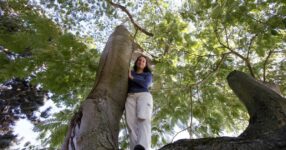How lucky for us who live within driving distance of our national forests.
This summer and the two before, those national treasures attracted many visitors who were trying to escape the excessive heat. To walk along shady forest trails and feel the cool air is a welcome relief. To observe an array of lush green plants including ferns, flowers, shrubs and trees, all growing abundantly without a watering system except Mother Nature’s, is a gift.
There is a way to have this experience in your own backyard, though on a much smaller scale. We are talking about pocket forests, also known as tiny forests, mini forests, sugi forests or wee forests. Japanese botanist and ecologist Akira Miyawaki conceived and developed the first pocket forest, lending the term “sugi” to their name. Sugi refers to a conifer in the cypress family that grows in Japan. Pocket forests are also referred to as Miyawaki forests.
Pocket forests yield many benefits to their visitors. Planting a pocket forest is a means of rapidly restoring native plant species in an ecosystem that may be damaged.
Sound complicated and difficult? A pocket forest could be easier to maintain than a lawn.
Since May of 2019, there were 200 of these forests planted in 53 cities on six continents that reconnected 57,675 visitors with nature.
These forests, often in urban areas, are 100% native, 30 times denser and 100 times more biodiverse than conventional tree plantations and may sequester 16 times more carbon.
Pocket forests may be small in scale, but they are densely planted, using the native trees and shrubs found in a real forest ecosystem. They can be as small as a few hundred square feet or as large as a whole acre.
Trees that form the canopy are planted very closely together but in a random placement, mimicking nature. The understory hosts many other trees, shrubs and flowers that occupy other layers of planting beneath the tree canopy.
All trees absorb carbon dioxide and clean and lower the temperature of the air. Many of us who live in the city are surrounded by concrete sidewalks, brick walls and asphalt roads. All these hard surfaces absorb heat all day and disperse it in the evening. Even tall buildings can gather a lot of heat each day during the warmer months.
Having your own pocket forest can lower the temperature in your yard, making your home a green oasis. A pocket forest can provide habitat for wildlife including birds, insects and small mammals and help manage storm water runoff and reduce soil erosion. Over time, they will create their own microclimates and grow into the mini forest you were looking for. Once established, they can be self-sustaining with little maintenance.
There are many more benefits, including improvements to your mental health. Just being in a forest setting can help lessen stress, anxiety and depression. There are social and economic benefits, too. Having a property with a forest area can increase its value.
Master Gardeners can help you get started by sharing some information. The North Yakima Conservation District has a sale each spring on the weekend after Mother’s Day at 1522 S. 18th Ave. They carry more than 25 species of wildflowers, trees and shrubs that you may want to include in your own pocket forest. Plant orders are taken online at www.northyakimacd.wordpress.com and ordering begins in February.
You can also contact the North Yakima Conservation District’s Heritage Garden Program to get great ideas. A plant expert can visit your home and guide you with a list of suggested plant materials. There is no charge for this valuable service. You can find them at www.hgcd.info.
Take a walk through the Yakima Area Arboretum for more ideas about what to plant and check out what resources are available at our Yakima Regional libraries.
Consider the impact a pocket forest could have, not just on you and your family, but on the entire community. Pocket forests beautify and improve school campuses, church grounds, businesses and city parks.
• For any gardening questions, contact the Master Gardener Clinic at 509-574-1604 or email gardener@co.yakima.wa.us.




